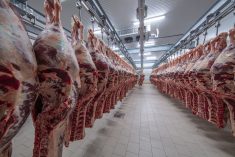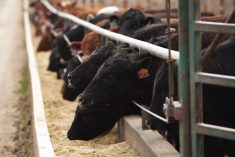Agrifood firm Cargill has budgeted $22 million to swap out an electric stunning system at its London, Ont. chicken processing plant in favour of a new controlled atmospheric stunning (CAS) system.
The CAS system, expected to be up and running this spring, “will help reduce handling stress with chickens, resulting in a higher-quality, more consistent product,” Claudecir Pagnussatto, the London plant’s general manager, said in a recent release.
The London plant, in business since 1987, has capacity to process about 80,000 chickens a day, supplying customers across Canada.
Read Also

JBS profit falls amid still-challenging US market environment
JBS, the world’s largest meat company, reported a net profit fall in the third quarter in spite of a rise in global net sales amid a still-challenging beef market environment in the U.S., according to an earnings statement on Thursday.
The move to the new stunning system is meant to help address “growing interest from customers and consumers for continuous improvement in humane handling of food animals,” the company said.
Both electric and CAS stunning systems are “approved, proven and acceptable” for humane poultry harvesting, Cargill said, but “a growing number of consumers and customers are expressing a desire for CAS systems at poultry facilities.”
To stun birds — that is, to render them unconscious before slaughter — using CAS involves depriving birds of oxygen in their transport crates, by introducing high concentrations of carbon dioxide or a mixture of inert gases.
Animal welfare organizations such as the Humane Society of the United States and PETA have previously pressed for chicken processors to drop electrical stunning in favour of CAS systems.
U.S. livestock handling expert Dr. Temple Grandin, in a 2013 evaluation of CAS against electrical stunning for poultry, wrote that while insensibility “is not instantaneous” for birds in a CAS system, “overall bird welfare would be improved with gas stunning even if there is some discomfort before the bird loses consciousness.”
If the reactions from chickens to a CAS system are “limited to gasping and head shaking only,” it “would probably be less distressful to the birds than live shackling” for electrical stunning, she wrote.
Grandin, in her evaluation, recommended any commercial-grade CAS system include windows or cameras to allow for direct observation of its performance, which is “the only way to verify that a commercial system is inducing insensibility with a minimum of discomfort.”
Cargill bills itself as a “pioneer” in the use of CAS, having introduced it at a U.S. turkey processing facility more than a decade ago.
Dr. Stephanie Cottee, Cargill’s global head of poultry welfare in London, said in its release that the company is committed to “ensuring the highest standards of animal welfare are maintained and believes all food animals deserve respect and dignity prior to harvesting.” — AGCanada.com Network














